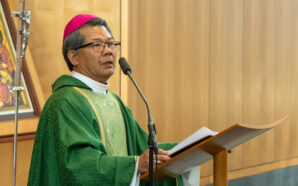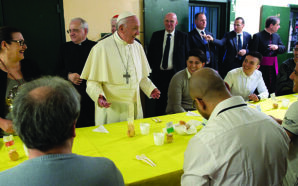21 March is World Poetry Day and Down Syndrome Day
Down Syndrome Day is a time for reflection and celebration. In conversation about people with Down Syndrome we usually hear two different opinions. One view sees it as pitiable and a burden that ideally would have been eliminated by terminating the pregnancy. This view is not new. It was held in many ancient cultures. The other sees people with Down Syndrome as a gift to be treasured. Through them we learn and celebrate what is deepest in our humanity. In early Christian societies they were seen to bear the image of the King.
When Michelle Payne won the Melbourne Cup on the long-shot Prince of Penzance in 2015, even people who had lost their money were delighted at the unbridled joy they saw in Stevie, Michelle’s brother, who has Down Syndrome, at the love that bound him to his sister and family, and at the skills he brought to his work.
He and so many people born with Down Syndrome are clearly a gift to their families, a testing gift certainly, that makes those close to them grateful for their lives. They reflect God’s goodness and wisdom in ways that call into question much conventional wisdom. In their company we often feel invited to soften the hard edges in our relationships. We are also led from calculating the costs and benefits people bring us to value the simple humanity and love we see in them. Love makes central people who seemed to be marginal, and makes us able to celebrate the simplest and apparently most inconsequential aspects of our relationships.
Our work at Jesuit Social Services helps us understand how Down Syndrome can be a gift. We meet many people who in childhood have been deprived of love, stability and hope. Yet when these people meet others who stick with them they learn to celebrate and help us to celebrate the gift that is life.
Coincidentally Down Syndrome Day is also World Poetry Day. The two days do run together well. Poetry, too, is about discovering depth and value in people and situations we might see as ordinary and even useless.
Poetry is also challenges any idea that real value can be measured and calculated, and that you can judge the worth of people by their intelligence, their achievements and their wealth. Poetry is unprofitable and an inefficient use of time. But poets are often the people of whom tyrants are most afraid because they see through the shallow, the cheap and the brutal. They are like doctors who take the temperature of a society and diagnose its ills.
Poets can also see the complex relationship between vulnerability of childhood and gift. Australian poet Francis Webb, who suffered from mental illness, caught beautifully the depth of humanity in the most vulnerable human being. He speaks of holding a five day old child at Christmas time:
If this is man, then the danger
And fear are as lights of the inn,
Faint and remote as sin
Out here by the manger.
In the sleeping, weeping weather
We shall all kneel down together.
Both people with Down Syndrome and poets encourage us to leave our impregnable fortresses and all kneel down together.
Fr Andrew Hamilton SJ writes for Jesuit Communications and Jesuit Social Services.








